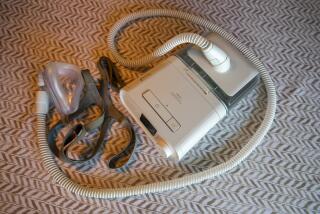Consumer Reports targets medical devices’ safety
- Share via
Consumer Reports has criticized the safety testing that went into the Lap-Band weight-loss device, raising concerns about poor regulatory oversight of medical equipment implanted in U.S. patients.
In a report issued Wednesday the consumer magazine also expressed concerns about risks related to surgical mesh, metal hips and certain cardiac devices. It highlighted how the federal government allows some products to be sold with little or no advance safety testing.
Consumer Reports questioned the effectiveness of Allergan Inc.’s Lap-Band product and said government approval was based on a clinical study of only 299 patients. The magazine said 25% of those patients had their bands removed before the end of the three-year study because of complications or failure to lose enough weight.
“Imagine if a car had a recall rate that high,” said John Santa, director of the Consumer Reports Health Ratings Center. “Consumers and regulators would be up in arms.”
Allergan has sold more than 650,000 Lap-Bands worldwide, and it is the world’s top manufacturer of surgically implanted bands that constrict the stomach to limit food intake. The Irvine company said it controls more than 80% of the market.
The company cites the 1995 study of 299 patients on its product labeling and said these patients experienced “significant improvement” in weight loss after placement of the Lap-Band.
Allergan spokeswoman Naziah Lasi-Tejani said the Lap-Band “has been approved internationally since 1993, and as such has a 19-year safety and effectiveness record.”
Last year, the Food and Drug Administration allowed the Lap-Band to be marketed to less-obese patients and cited a study that showed 80% of patients using the product lost at least 30% of their excess weight and kept it off for one year.
Rita Redberg, a professor of medicine and cardiologist at UC San Francisco, said Allergan and other medical-device manufacturers are complying with current federal regulations. It’s those lenient standards that are the problem, she said.
“What the device industry is doing is certainly legal,” Redberg said. “There needs to be congressional action to improve the requirements for the safety and effectiveness of high-risk medical devices. A lot of people have these devices or they are candidates for one.”
In a recent survey conducted by the Consumer Reports National Research Center, 17% of American adults reported having an implanted medical device.
Last year, the Institute of Medicine issued a report saying the current approval process for medical devices was flawed. It urged the Food and Drug Administration to develop a new regulatory system to ensure patient safety.
Consumer Reports said some of the potential risks from the artificial hips cited included metal poisoning and tissue destruction, and the surgical mesh could shift in some cases and cause nerve damage.
In a statement, the FDA said it “continues to strengthen how we review devices, including the science that supports that review.” The agency said it’s working on a new national surveillance program that should provide more information on medical devices once they are on the market and being used by patients. The FDA also said that last year it directed manufacturers of metal hips and surgical mesh to address specific safety issues.
Nancy Metcalf, a senior program editor at Consumer Reports and author of this report, said the government sets far more rigorous standards for pharmaceutical companies conducting clinical trials for new prescription drugs. For now, Metcalf urges prospective patients to research devices on the FDA website and look into online forums where consumers indicate trouble with their device.
In Southern California, five patients have died since 2009 after undergoing Lap-Band surgeries at clinics affiliated with the 1-800-GET-THIN marketing company, according to lawsuits, autopsy reports and other public records. Last month, Allergan said it would discontinue the sale of the Lap-Band to all entities affiliated with 1-800-GET-THIN.
More to Read
Inside the business of entertainment
The Wide Shot brings you news, analysis and insights on everything from streaming wars to production — and what it all means for the future.
You may occasionally receive promotional content from the Los Angeles Times.











